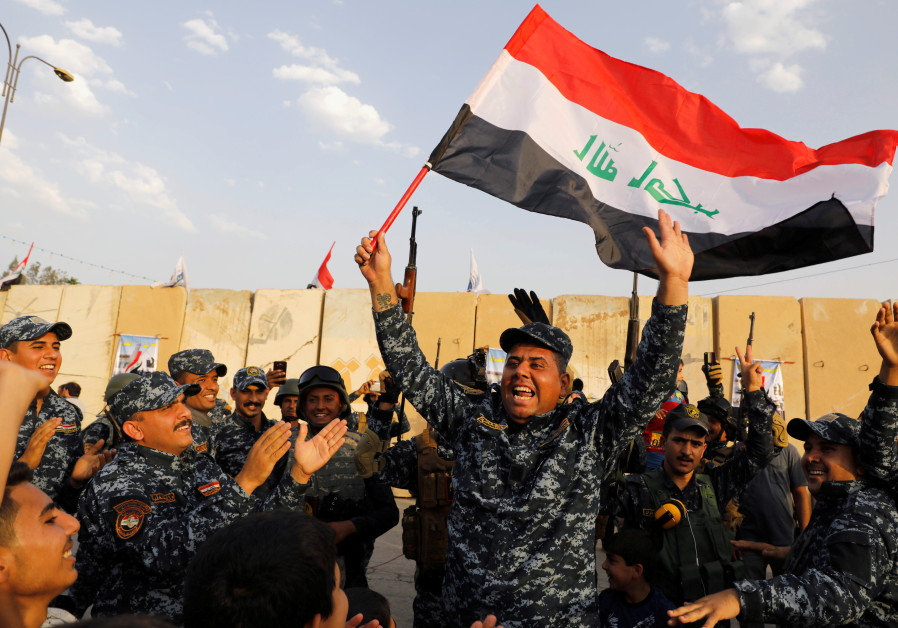The shocking takeover of a large part of central and western Iraq by Islamic State in 2014 haunts people today across the country.
Seth J. Frantzman

The shocking takeover of a large part of central and western Iraq by Islamic State in 2014 haunts people today across the country.
With fires burning in Sinjar, an area ISIS targeted in August 2014 and the scene of its genocide of the Yazidi minority, people can’t help but remember that five years after ISIS blitzkrieged its way into Mosul, it is still a threat. Questions also remain about how the Iraqi army failed to stop the advance and whether the enemy will return.
On Twitter local photographer and academic Ali Y. Al-Baroodi tweeted a photo of Mosul on June 10, 2014, when ISIS had attacked Iraq’s second largest city. He recalled the first morning under ISIS control. “The battle was still raging, the army did not fight. High ranking commanders were the first to flee.” Soldiers were left aimless, without orders or clarify of what to do.
Mosul is a large city that sits bestride the Tigris river.
On the western side is the old part of the city with its warren of alleys and also the airport. On the eastern side, what locals call the left bank, is the more modern suburbs, the ancient ruins of Mosul, the five-star hotels and the university.
This city had been famous for its merchants and also for local support for Saddam Hussein in the 1980s. But after the US invasion of 2003 the city was rocket by terror attacks, rising to daily bombings and shootings. The reaction of the government of Prime Minister Nouri al-Maliki in the years before ISIS was a crackdown.
ISIS found support when it arrived, but no one expected it to conquer the city so swiftly. Instead the Iraqi army seemed to evaporate, abandoning thousands of vehicles across Iraq, and towed artillery, weapons, and other items that would help ISIS in its quest to take over Iraq.
Mosul residents didn’t know what to expect. Some fled the ISIS surge and then returning, hoping it wouldn’t be so bad. Instead ISIS began a systematic crushing of dissent, expelling Christians from the city, and preparing for the speech ISIS leader Abu Bakr al-Baghdadi would give in early July 2014, declaring a “caliphate.” Baghdadi spoke at the al-Nuri mosque, overlooked by the Hadba, or leaning humpbacked minaret. In 2017 the mosque would be destroyed when the last battle against ISIS took place in the city.
As ISIS was conquering Mosul with one column of fighters it also struck at Camp Speicher north of Baghdad. There it captured more than 1,700 mostly Shi’ite air force cadets. In several days of mass murder it slaughtered and filmed the deaths of the young men. ISIS bragged on social media about its crime.
Most of the world remained silent. “Camp Speicher Massacre remains one of the most horrific yet under-reported tragedies in armed conflict history,” tweeted journalist Rasha Al-Aqeedi on Wednesday. “A combination of rampant sectarianism against Shia, grudges of the old regime, mismanagement of the security apparatus and other ills that much reflected Iraq.”
ISIS crimes five years ago were largely ignored abroad. Kenneth Roth, head of Human Rights Watch, tweeted on June 12, 2014 that “ISIS in Iraq reportedly tried not to alienate local population, unlike PM Maliki and his violent sectarian repression.” Executing 1,700 people would seem to be a form of alienation in retrospect.
Across Iraq today fires are smouldering, many of them allegedly set by ISIS. The group has settled in for a “war of attrition” and has been carrying out bombings, sniper attacks and starting fires. It is hard to keep track of the numerous security incidents that stretch from Sinjar to villages like Hamam al-Alil south of Mosul to Diyala and other provinces north of Baghdad.
Even as Iraq must face a continued threat there are families looking for loved ones lost in 2014. This includes men from Camp Speicher who were never found and more than 3,000 missing Yazidis kidnapped by ISIS in August 2014.
Five years later the anniversary feels like the present day as the anguish and continued security operations are a brutal reminder of what was.
Content retrieved from: https://www.jpost.com/Middle-East/Iraqis-remember-ISIS-massacres-five-years-later-592256?fbclid=IwAR1YPfaHyy7MFp9qykBvxd6tycQcbYVTvJwerSEVYUxvWDzmF6BmNds-ncE.